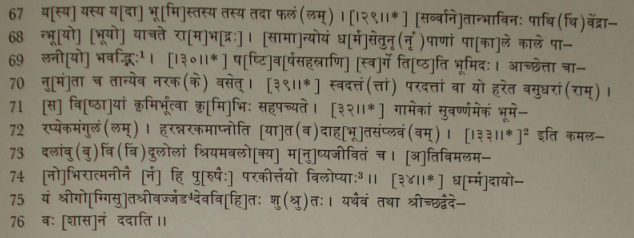|
The Indian Analyst
|
North Indian Inscriptions |
INSCRIPTIONS OF THE SILAHARAS OF NORTH KONKAN
TRANSLATION ..(V. 1) May the Goddess of Fortune, who resorts to (Vishṇu) whose eyes are longish like a fresh garden lotus, prosper, and may Śiva always abide with Umā (Pārvatī) whose eyes are longish like a lotus! ..(V. 2) May he (i.e. Vishṇu) whose navel-lotus Brahmā has made (his) abode, protect You−and also Siva, whose head has been adorned by a lovely digit of the moon!
.. (V. 3) From the eye of Atri was born the Moon, who has numerous nectar-like rays, who has gratified gods and who is capable of collecting into a mass the joys of the world. .. (V. 4) From his body was born Budha, who is honoured by the lord of gods; from him was born Purūravas, and from the latter, Ayu. .. (V. 5) Among kings who were thus born uninterruptedly (in that family) there was born Yayāti, whose son here was Yadu. .. (V. 6) From him was produced on the earth the race of the Yadus, which was an ornament of the three worlds, and had the other name of the illustrious Rāshṭrakūṭa−where Hari (i.e. Kṛishṇa) took birth. .. (V. 7) In that family was born the king Dantidurga. After him ruled his uncle Kṛishṇarāja (I), thereafter Gōvindarāja (I), next, Nirupama and after him Jagattuṅga. His son was Amōghavarsha (I), the abode of all good qualities, and his (son) was Akālavarsha. Thereafter was born (as his successor) the illustrious Emperor Indrarāja (III) of abundant and well-known fame. .. (V. 8) His illustrious brother was Amōghavarsha (III), who, having completely uprooted his (i.e. Indra III’s) son Gōjjiga (Gōvinda IV), who had committed injustice, himself ruled over the earth successfully. .. (V. 9) He, who was (reckoned) among the ascetics, having washed away his sins as he gave away his wealth for his spiritural welfare, attained great holiness. .. (V. 10) He who sat under three white (royal) umbrellas and who by his handsome form surpassed the god of love, shone as if he was waited upon by the autumnal moon which assumed three forms, mistaking him for the great Lord (Śiva). ..
(V. 11) Kṛishṇarāja (III), who was born to him as the six-faced Kārttikēya was to
Śambhu, as the Moon was to the sage Atri, as Rāma was to Daśaratha, (and) as Jayanta was
to Indra, became like him the lord of the Earth that has the four oceans for (her) girdle.
[1] Metre: Salini.
|
|||||||||||||||||||||||||||||||||||||||||||||||||||||||||||||||||||||||||||||||||||||||||||||||||||||||||||||||||||||
| > |
|
>
|








